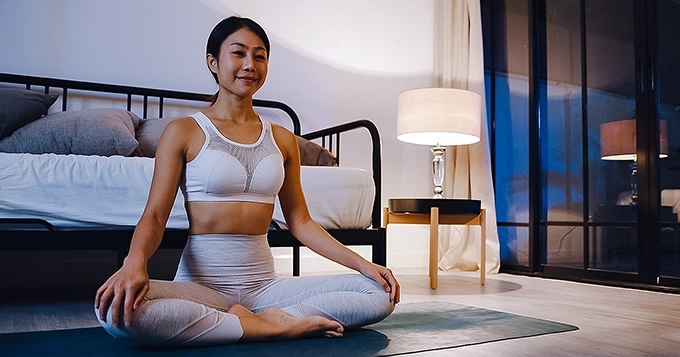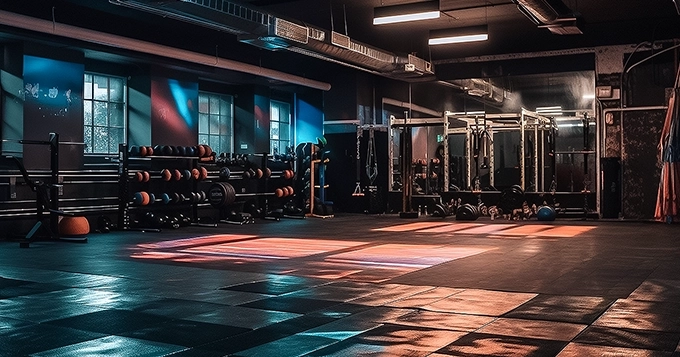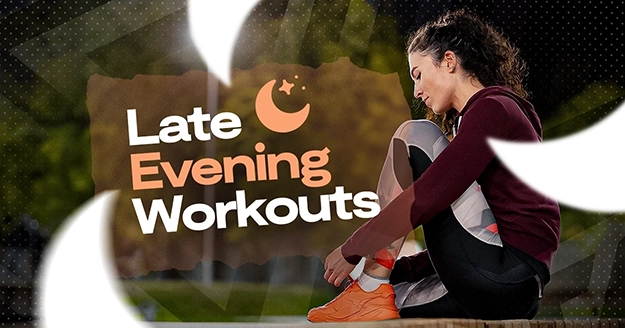Is exercising before bed bad for you?
Yes and no. This topic has been the subject of much debate among experts, with findings from various studies showing considerable variation.
Late evening workouts have become increasingly popular among individuals striving to maintain a healthy lifestyle despite busy schedules.
But what exactly is the impact of these nighttime sweat sessions on your overall health and sleep patterns? Let’s explore the science behind late evening workouts and their potential effects on your health and sleep patterns.
Benefits of Good Late Evening Workouts
-
Less Distractions
Exercising in a bustling gym can be fun and energizing, offering a vibrant atmosphere. However, this can involve waiting for equipment and occasionally conversing with other members. Opting for a late-night gym session allows you to sidestep the crowds, enabling you to concentrate solely on your workout without interruptions or delays.
If you find yourself hitting the gym much later in the evening, chances are you’ll have the place all to yourself. This offers a unique opportunity to add variety and enjoyment to your workout routine.
If you’ve been hesitant to try out a new machine in front of others, now is the perfect moment to give it a shot. Plus, if certain machines are usually occupied during the day, you’ll likely find them readily available at night, eliminating any need to wait your turn.
-
Boost Your Muscle Strength
If you’re aiming to boost your strength and make the most of your muscle power, it might be worth scheduling your workouts after the sun has set. A study in the Journal of Sports Science & Medicine suggests that peak muscle performance tends to happen during the afternoon and early evening due to changes in hormone levels and core body temperature. So, swapping your morning weightlifting session for an afternoon or evening workout could unlock some perks for you!
-
Good Way to Destress
After a hectic day, the allure of slipping into cozy attire and lounging on the couch is understandable. However, a late-night workout can be an excellent method to unwind and decompress.
Exercise triggers the release of feel-good brain chemicals, commonly called endorphins. These neurotransmitters work wonders in reducing stress levels and elevating mood, providing a natural and effective way to alleviate the day’s tensions.
-
Improve Your Performance
If you’ve ever felt like your morning exercise routine doesn’t quite pack the same punch as your workouts later in the day, you’re not alone—and there’s actually a scientific reason behind it!
Researchers have delved into the concept of circadian rhythms in muscles, discovering that muscle strength tends to reach its peak during the latter part of the day. Moreover, studies indicate that as body temperature rises later in the day, it can lead to enhanced flexibility and muscle strength, providing further insight into why afternoon or evening workouts might feel more productive for some individuals.
-
Help You Stay Consistent
For individuals with jam-packed schedules, exercising in the evening may offer a practical solution to maintain consistency. Consistency is a pivotal factor in achieving fitness goals. Fitting in a workout before bedtime can be a reliable way to ensure you stay on track with your exercise routine. Making evening workouts a habit establishes a consistent rhythm that reinforces your commitment to maintaining an active lifestyle, ultimately contributing to your overall well-being.
Cons of Late Night Exercise
Lack of Group Classes
It’s worth noting that exercising in a group setting has its advantages. Research indicates that individuals who engage in group exercise classes tend to report higher levels of perceived physical and emotional well-being compared to those who work out alone or with just one or two others.
While certain gyms and fitness centers might provide evening classes, many instructor-led group workout sessions are typically scheduled during the daytime or early evening hours. The availability of later classes could vary depending on your location and the facilities nearby.
Less Variety in Your Workout Routine
Exercising in the evening can restrict the types of physical activities you can engage in. For instance, you might need to forgo activities like cycling, jogging, or running in your neighborhood due to nighttime crowds. Additionally, you might miss out on group workout sessions that are often organized during the day.
Consistency May Be Harder
A study conducted in 2018 revealed that individuals who exercise in the morning are more likely to maintain consistency with their workouts compared to those who exercise in the afternoon or evening. This result could be attributed to the fact that exercising later in the day leaves more room for distractions from spontaneous plans or a lack of motivation after a busy day.
However, everyone’s daily routine varies. If you prefer evening workouts, you can establish consistency by scheduling your workout and adhering to your commitment.
Does Evening Exercise Affect Sleep?
Yes! It has both positive and negative impacts on sleep.
Moderate Late Evening Exercise:
Engaging in moderate late evening exercise can actually help improve sleep for many individuals. Activities like brisk walking, gentle yoga, or light strength training can promote relaxation and reduce stress, making it easier to unwind and prepare for sleep. Additionally, moderate exercise can help regulate body temperature, leading to a more restful night’s sleep.
Intense Exercise:
On the other hand, intense exercise, especially if performed too close to your bedtime, can disrupt sleep patterns. Vigorous activities like high-intensity interval training (HIIT), heavy weightlifting, or intense cardio workouts can elevate heart rate, increase adrenaline levels, and stimulate the sympathetic nervous system, making it difficult for your body to transition into a relaxed state conducive to sleep.
How Do You Know if Working Out at Night Works For You?
- Try exercising in the mornings for one month:
– Set a specific time and duration for your workout or walk and aim to stick to it consistently.
– Evaluate how you feel before starting each morning workout: Are you waking up easily? Do you feel excited about exercising? Are you maintaining consistency?
- Try exercising after 8:00 PM for the next month:
– Choose a time for your evening workout, ensuring you have enough time after your dinner and at least two hours before bedtime.
– Assess your evening workout experience: Ask yourself the same questions as before, and monitor any changes in your sleep patterns. Are you sleeping better, worse, or the same after an evening workout?
After completing this experiment, you can assess your experiences. The goal is to determine when you find more enjoyment in exercising. Being eager about your workouts usually results in better consistency. You can decide whether morning or evening workouts suit you best based on your findings.
Tips for Good Late Night Workouts
- Monitor Intensity: Opt for low to moderate-intensity exercises such as yoga, stretching, or light cardio before bed. These activities are less likely to leave you feeling overly stimulated and can help promote relaxation.
- Timing: Aim to finish your workout at least 1-2 hours before sleeping to allow your body time to cool down and relax.
- Give Yourself Time to Wind Down: Incorporate a proper cool-down routine after your workout, including calming activities such as gentle stretching, deep breathing, or meditation.
- Listen to Your Body: Pay attention to how exercising before bed affects your sleep quality. If it consistently disrupts your sleep, consider shifting your workout to earlier in the day.
Conclusion
Whether exercising before bed is “bad” can vary from person to person. Factors such as personal preferences, individual circadian rhythms, fitness level, and exercise intensity all play a role in how late night workouts impact your health and sleep quality. What works well for one person may not be effective for another.









